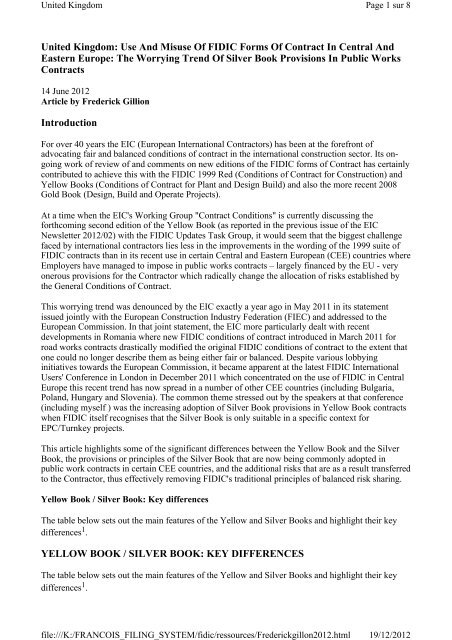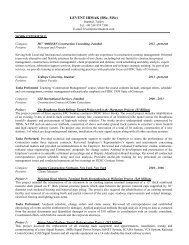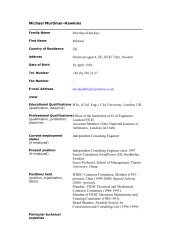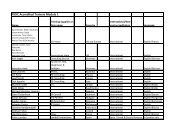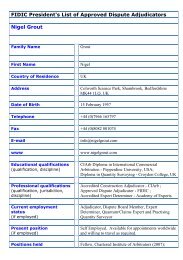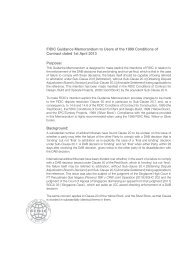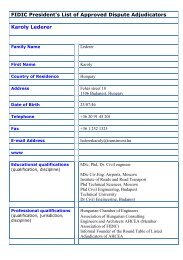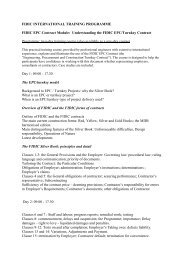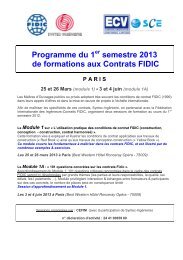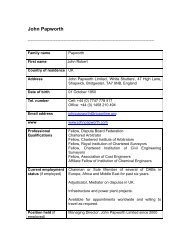United Kingdom: Use And Misuse Of FIDIC Forms Of Contract In ...
United Kingdom: Use And Misuse Of FIDIC Forms Of Contract In ...
United Kingdom: Use And Misuse Of FIDIC Forms Of Contract In ...
Create successful ePaper yourself
Turn your PDF publications into a flip-book with our unique Google optimized e-Paper software.
<strong>United</strong> <strong>Kingdom</strong>file:///K:/FRANCOIS_FILING_SYSTEM/fidic/ressources/Frederickgillon2012.htmlPage 3 sur 819/12/2012can be relatively short.particular to inspect the Siteand examine data hydrologicaland subsurface data and alsoto scrutinise the Employer'sRequirements (see Designbelow).DesignThe <strong>Contract</strong>or is responsible for design of the Works (sub-Clause 5.1), and is required to design the Works in accordancewith the <strong>Contract</strong> such that, when completed, the Works are fitfor purpose (Sub-Clause 4.1) and gives an undertaking that thedesign will be in accordance with the documents forming part ofthe <strong>Contract</strong>, which include the Employer's Requirements (Sub-Clause 5.3).The <strong>Contract</strong>or is notresponsible for any error, faultor other defect found in theEmployer's Requirements tothe extent that "an experiencedcontractor exercising duecare" would not havediscovered the error, fault ordefect before submitting itstender (Sub-Clause 5.1).The <strong>Contract</strong>or is deemed tohave scrutinised theEmployer's Requirements andis responsible for the accuracyof the Employer'sRequirements (includingdesign criteria andcalculations), except for thematters identified in subparagraphs(a) to (d) in Sub-Clause 5.1 2 .<strong>Contract</strong> Price and PaymentLump sum price<strong>Contract</strong>or's rights to claimadditional time / moneyThe Employer will seek alower tender price but isprepared to accept certainrisks during the course of theproject.<strong>In</strong>terim and final payments arecertified by the Engineer.Various rights for the<strong>Contract</strong>or to claim additionaltime / money under the<strong>Contract</strong>, including in respectof those risks borne by theEmployer in respect of errorsin the Setting Out data (Sub-Clause 4.7), errors in the Sitedata (Sub-Clause 4.10) andunforeseen Site risks (Sub-Clause 4.12).The Employer will typicallyaccept the cost premiumattached to the "turn key"approach, so as to limit itsexposure to additionaltime/money claims.<strong>In</strong>terim and final payments aremade without certification;typically determined byreference to a Schedule ofPayments.Limited rights for claim the<strong>Contract</strong>or to claim additionaltime / money under the<strong>Contract</strong>. Sub- Clause 8.4[Extension of Time forCompletion] does not includethe right to an extension oftime in the event ofexceptionally adverse climaticconditions or unforeseeableshortages.
<strong>United</strong> <strong>Kingdom</strong>file:///K:/FRANCOIS_FILING_SYSTEM/fidic/ressources/Frederickgillon2012.htmlPage 4 sur 819/12/2012When are the Silver Book conditions of contract unsuitable?When one compares the Silver Book with the Yellow Book, it is clear that the significant differenceslie with the greater allocation of risks to the <strong>Contract</strong>or. Such an allocation of risk may be suitablewhen the Employer wants a greater degree of certainty in price and time and as long as it is preparedto pay a higher price in order to achieve that and to give the <strong>Contract</strong>or sufficient time at tender stageto examine the Employer's Requirements, to verify all relevant information and data and to make allnecessary investigations so as to assess the severity of the risks it is taking.Conscious that the Silver Book should therefore only be used for Design-Build projects wherespecific conditions are met, <strong>FIDIC</strong> makes clear in the <strong>In</strong>troductory Note to the Silver Book that theseconditions of contract are not suitable in the following circumstances:” If there is insufficient time or information for tenderers to scrutinise and check the Employer'sRequirements or for them to carry out their designs, risk assessment studies and estimations(taking particular account of Sub-Clauses 4.12 [Unforeseeable Difficulties] and 5.1 [GeneralDesign Obligations]);” If construction will involve substantial work underground or work in other areas whichtenderers cannot inspect;” If the Employer intends to supervise closely or control the <strong>Contract</strong>or's work, or to reviewmost of the construction drawings;” if the amount of each interim payment is to be determined by an official or other intermediary.<strong>FIDIC</strong> then recommends that the Yellow Book be used in the above circumstances for Worksdesigned by (or on behalf of ) the <strong>Contract</strong>or. Prima facie, this is what many employers in the publicsector in CEE countries have done but quite perversely they have sometimes altered the YellowBooks general conditions by adopting Silver Book provisions so as to obtain a greater certainty ofprice. Key risks placed on the Employer have as a result been transferred to the <strong>Contract</strong>or, thuseffectively removing the fair and equitable allocation of risks under the Yellow Book. This isexplained further below.The adoption of Silver Book principles and provisions in public works contracts in CEEcountriesTrend No. 1 / <strong>Contract</strong> Administration - The role of the Engineer reduced to being theEmployer's Representative as in the Silver BookThe role of the Engineer under the Red and Yellow Books has always been the subject of muchcontroversy due to the difficulty of reconciling the dual role of the Engineer as agent of theEmployer and as decision-maker in respect of certain key matters under the <strong>Contract</strong>, including thedetermination of the <strong>Contract</strong>or's entitlement to additional payment and an extension of time, theinstruction and valuation of variations and the issue of Payment Certificates, Taking-Over Certificateand Payment Certificates.Under the Red and Yellow Books, the Engineer is expected to exercise his sole discretion whendeciding those matters and also to act fairly whenever they require a determination under Sub-Clause3.5 (additional payment, extension of time and variations).<strong>In</strong> practice, however, employers in the public sector in CEE countries have frequently sought toamend Sub-Clause 3.1 [Engineer's Duties and Authority] in order to restrict the Engineer's authorityby requiring the Engineer to obtain the express approval of the Employer before deciding those keymatters. For example this has been the case in Romania where over the past 4-5 years thegovernment has gone even further by not only amending Sub-Clause 3.1 but also making thatamendment compulsory for road works projects with the introduction of its new <strong>FIDIC</strong>-based
<strong>United</strong> <strong>Kingdom</strong>file:///K:/FRANCOIS_FILING_SYSTEM/fidic/ressources/Frederickgillon2012.htmlPage 5 sur 819/12/2012General Conditions of <strong>Contract</strong> 3 .Although, in theory, the existence of that requirement alone does not necessarily mean that theEngineer will not make determinations fairly, there is of course a strong risk that the Employer mayinstruct the Engineer to withhold his determination or direct him to make a particular determination.If this happens, then the Engineer's role will in effect be limited to his role as an agent of theEmployer and he will become no more than the Employer's Representative in the Silver Book whoacts wholly for the benefit of the Employer, his principal.The amendment introduced in Romania by the new <strong>FIDIC</strong>-based General Conditions of <strong>Contract</strong> toSub-Clause 3.4 of the General Conditions of <strong>Contract</strong> [Replacement of the Engineer] seems toconfirm that trend. The new Sub-Clause 3.4 has removed the <strong>Contract</strong>or's right to raise objections tothe proposed appointment of a replacement Engineer. The Employer can now under the new GeneralConditions of <strong>Contract</strong> proceed with his appointment without even consulting the <strong>Contract</strong>or.It is also frequent in certain CEE countries for employers in the public sector to request the issue ofdraft <strong>In</strong>terim Payment Certificates for their review / approval, thus effectively putting the Employerin a position of self-certifier.Would those restrictions to the Engineer's authority really affect the administration of the contract?Putting aside <strong>FIDIC</strong>'s policy which favours a fair and impartial Engineer for the good of the projectas a whole, the answer to this question obviously depends on whether the Employer intends to dealpromptly and fairly with the <strong>Contract</strong>or's claims for time and money, the financial impact ofvariations, etc. Ultimately, if the Employer were to instruct the Engineer to withhold hisdetermination or to instruct him to make a particular determination, then the Employer would be inbreach of its undertaking under Sub-Clause 3.1 not to place any further constraints on the authorityof the Engineer. The <strong>Contract</strong>or may also be able to rely on Sub-Clause 1.3 [Communications]which provides that any "Approvals, certificates, consents and determinations shall not beunreasonably withheld or delayed."Trend No. 2 - Extra risks borne by the <strong>Contract</strong>or under the Silver Book are now frequentlybeing transferred to the <strong>Contract</strong>or in D&B projects where the Silver Book is not suitableMore importantly, in some CEE countries such as Poland and Romania, key risks borne by the<strong>Contract</strong>or under the Silver Book are now being allocated to the <strong>Contract</strong>or even in Design and Buildprojects where the Silver Book is not suitable. Those risks include errors in the Setting Out data(Sub-Clause 4.7) inaccurate or incomplete Site data (Sub-Clause 4.10), Unforeseeable physicalconditions (Sub-Clause 4.12) and errors in the Employer's Requirements (Sub-Clause 5.1).Errors in the Setting Out data (Sub-Clauses 4.7 YB/SB), Sub-Clause 4.7 of the Yellow BookThe <strong>Contract</strong>or is entitled (subject to Sub-Clause 20.1) to time and cost plus profit from executingwork which was necessitated by an error in the setting-out data, which an experienced contractorcould not reasonably have discovered. This is in contrast with the Silver Book where the <strong>Contract</strong>ortakes responsibility for any errors in the setting out data contained within the Employer'sRequirements (Sub- Clause 5.1 of the Silver Book deems the <strong>Contract</strong>or responsible for the accuracyof the Employer's Requirements with certain limited exceptions). The <strong>Contract</strong>or therefore retainsunder the Silver Book the risk arising from errors in setting-out.A usual criticism of EU-financed projects in CEE countries has been that the Employer'sRequirements lack in precision, often because the Employer rushes to launch new tenders in order toabsorb the relevant EU funds. Unreliable tender documents have sometimes resulted in significanterrors in setting-out, which could lead to significant delays at the outset of the project.
<strong>United</strong> <strong>Kingdom</strong>file:///K:/FRANCOIS_FILING_SYSTEM/fidic/ressources/Frederickgillon2012.htmlPage 6 sur 819/12/2012<strong>In</strong> order to avoid claims from contractors resulting from errors in setting-out, the RomanianGovernment has essentially adopted the approach of the Silver Book by retaining only the firstparagraph of Sub- Clause 4.7 and deleting the rest of that subclause in the new <strong>FIDIC</strong> GeneralConditions of <strong>Contract</strong> (Yellow Book) applicable to road works. It follows that the <strong>Contract</strong>or is nowrequired to rectify any error in the setting-out data provided by the Employer and the Engineer but isnot entitled to make any claim in this connection. Also, as it is explained below, those new <strong>FIDIC</strong>General Conditions of <strong>Contract</strong> have introduced a significant amendment to Sub-Clause 5.1 to theeffect that the <strong>Contract</strong>or becomes responsible for the accuracy of the Employer's Requirements as inthe Silver Book.<strong>In</strong>accurate or incomplete Site data (Sub- Clauses 4.10 YB/SB)Under Sub-Clause 4.10 of both the Yellow Book and the Silver Book, the Employer is required tomake available to the <strong>Contract</strong>or all relevant data in the Employer's possession on sub-surface andhydrological conditions on the Site and is under a continuing obligation to make available to the<strong>Contract</strong>or all such data which come into the Employer's possession after the Base Date (i.e 28 daysprior to the latest date submission of the Tender).As this obligation can potentially be quite far-reaching for the Employer, some employers in CEEcountries have sought either to expressly exclude (subject to certain limited exceptions in Sub-Clause5.1) the Employer's responsibility for the accuracy or completeness of such data as in the SilverBook, or to insert a wording limiting that obligation to the tender stage and expressly excluding the<strong>Contract</strong>or's right to claim for an extension of time and / or additional payment in the event ofinaccurate or incomplete information.Unforeseeable physical conditions (Sub- Clause 4.12)Adverse physical conditions unforeseen at tender stage have been a common cause of delay anddisputes in EU-financed projects in CEE countries. The reason for this has again often been due tothe lack of project preparation before a tender is launched leading to discrepancies between thegeological and hydrological conditions anticipated at tender stage and the actual Site conditions.Again, the <strong>FIDIC</strong> Yellow and Silver Books provide again two radically different approaches. Asseen above, whilst that risk is borne by the Employer under the Yellow Book to the extent that suchphysical conditions could not reasonably be foreseeable by an experienced contractor by the date forsubmission of the Tender, the Silver Book generally places that risk on the <strong>Contract</strong>or.Under the Silver Book, the <strong>Contract</strong>or is deemed to have obtained all necessary information to assessrisks and circumstances which may influence or affect the Works (Sub-Clause 4.12(a)); consideredall such information and accepts total responsibility for having foreseen all difficulties (Sub-Clause4.12(b)), and should have allowed, within its Tender, sufficient time and funds to carry out theWorks (Sub-Clause 4.12(c) providing that "the <strong>Contract</strong> Price shall not be adjusted to take account ofany unforeseen difficulties or costs").It is therefore not surprising that some employers in CEE countries have sought to include SilverBook provisions in Yellow Book contracts. The most extreme example is again in Romania wherethe wording of the Silver Book has literally replaced Sub- Clause 4.7 of the Yellow Book for thosepublic work contracts in the road sector. Given the nature of the work involved, allocating the risk ofunforeseen ground conditions to the <strong>Contract</strong>or appears to be totally inappropriate as <strong>FIDIC</strong> itselfrecognises in its "<strong>In</strong>troduction to the use of <strong>FIDIC</strong>'s conditions of <strong>Contract</strong>."4 This is even more sowhen, as it is often the case, there is insufficient time or information for tenderers to carry out theirown investigations.Errors in the Employer's Requirements (Sub- Clauses 1.9 YB and 5.1)
<strong>United</strong> <strong>Kingdom</strong>file:///K:/FRANCOIS_FILING_SYSTEM/fidic/ressources/Frederickgillon2012.htmlPage 7 sur 819/12/2012Errors in the Employer's Requirements have also been a frequent cause of claims pursuant to Sub-Clause 1.9 of the Yellow Book due to the lack of project preparation before the launch of tenders inCEE countries and the resulting lack of precision of the Employer's Requirements. <strong>In</strong>stead oftackling this issue by improving the quality of the project documentation, sometimes employers havesimply chosen to adopt the regime of design responsibility of the Silver Book by allocating that riskto the <strong>Contract</strong>or. The problem is that they did so without allowing sufficient time at tender stage forthe <strong>Contract</strong>or to scrutinise the Employer's Requirements and certainly without accepting the costpremium attached to this significant risk.<strong>In</strong> Romania, the situation went even further with the adoption of the new <strong>FIDIC</strong>-based Conditions of<strong>Contract</strong> applicable to road works. The new Sub-Clause 5.1 not only adopts the wording of the SilverBook in terms of the <strong>Contract</strong>or's responsibility for the Employer's Requirements, but it also restrictsthe number of exceptions only to those matters stated in sub-paragraphs (a) to (c) of Sub-Clause 5.1.Sub-paragraph (d) which excludes the <strong>Contract</strong>or's responsibility for "portions, data and informationwhich cannot be verified by the <strong>Contract</strong>or except as otherwise stated in the <strong>Contract</strong>" has beenomitted from that new Sub-Clause 5.1, therefore creating an even more onerous design obligation forthe <strong>Contract</strong>or than in the Silver Book.Trend No. 3 - Restriction of the <strong>Contract</strong>or's right to claim additional time / money in respectof risks traditionally borne by the Employer under the Silver BookAdmittedly, in some CEE Countries the Employer's clear objective to obtain a higher degree ofcertainty of price and construction time can be understood given that most public works projects inthose countries rely for a very large part on EU financing and that very limited funds exist in theState budget to finance these projects.However, some CEE countries may have taken that objective which underlies the Silver Book a steptoo far by restricting the <strong>Contract</strong>or's rights to claim additional time and money in respect of riskswhich are traditionally borne by the Employer, even under the Silver Book.Those matters which clearly fall within the Employer's responsibility in public works projectsinclude for example access to the Site (Sub-Clause 2.1) and changes in legislation (Sub-Clause 13.7).Lack of possession of / access to the Site has in most CEE countries been one of the main causes ofdelays to public infrastructure projects due to the lengthy expropriation procedures in place in thosecountries. Although new legislation has been passed in recent years to simplify and speed up theprocedure for the compulsory acquisition of land for State infrastructure projects, this problemremains a significant one.<strong>In</strong> order to restrict the <strong>Contract</strong>or's right to claim additional time and money pursuant to Sub-Clause2.1, some employers have sought to amend this sub-clause by limiting that obligation to the landalready owned by the Employer at the Commencement Date. New contracts of road works inRomania now allow the Employer to give the <strong>Contract</strong>or access to the Site gradually in sectionswhilst requiring the <strong>Contract</strong>or to adjust its Programme of Works to reflect this sectional completionof the Works. The <strong>Contract</strong>or also waives any right to claim in respect of the handing over of the Sitein sections, irrespective of the size of those sections, their location, or the additional costs associatedwith a completion of the Works in sections.As for the <strong>Contract</strong>or's right to claim time and costs as a result of changes in legislation, such rightsometimes excludes VAT increases, for example in Poland or in Slovenia."Trend No. 4" – Cap on adjustments to the <strong>Contract</strong> Price<strong>In</strong> order to obtain almost a guarantee of certainty with the <strong>Contract</strong> Price, the Romanian Government
<strong>United</strong> <strong>Kingdom</strong>file:///K:/FRANCOIS_FILING_SYSTEM/fidic/ressources/Frederickgillon2012.htmlPage 8 sur 819/12/2012went as far as including a cap on any adjustment to the <strong>Contract</strong> Price, save for adjustments resultingfrom changes in legislation under Sub-Clause 13.7 and changes in costs under Sub-Clause 13.8 (ifthe contract include a price escalation mechanism).<strong>In</strong> the new Romanian <strong>FIDIC</strong>-based General Conditions of <strong>Contract</strong> (Yellow Book), Sub-Clause 14.1[The <strong>Contract</strong> Price] now provides that the <strong>Contract</strong> Price shall not be increased by more than 10%of the Accepted <strong>Contract</strong> Amount, meaning that any payment of variations instructed by theEngineer will be capped to that level. This obviously represents a significant financial risk for the<strong>Contract</strong>or even though the applicable law may offer a basis for payment of any varied works whereits value exceeds 10 % of the Accepted <strong>Contract</strong> Amount. Luckily, such a cap on adjustments to the<strong>Contract</strong> Price does not seem to be common in other CEE countries and will hopefully not be a trendas such.ConclusionDue to its far-reaching effects for contractors, the new <strong>FIDIC</strong>-based General Conditions of <strong>Contract</strong>introduced by the Romanian Government in March 2011 for road works projects have become animportant casus belli for the EIC and international contractors operating in Romania.However, beyond Romania, there is undoubtedly a growing trend in the region for significant riskstraditionally borne by employers under the <strong>FIDIC</strong> Yellow Book to be transferred to contractors inpublic works projects, often by importing provisions or principles from the Silver Book.Such a trend calls for a rapid change in EU secondary legislation so as to ensure that EU-financedcontracts do reflect <strong>FIDIC</strong>'s principles of balanced risk sharing.Footnotes1 The <strong>FIDIC</strong> <strong>Contract</strong>s Guide (1st Edition, 2000), p.4.2 Those matters are:"(a) portions, data and information which are stated in the <strong>Contract</strong> as being immutable or the responsibilityof the Employer,(b) definitions of intended purposes of the Works of any parts thereof,(c) criteria for the testing and performance of the completed Works, and(d) portions, data and information which cannot be verified by the <strong>Contract</strong>or except as otherwise stated inthe <strong>Contract</strong>."3 These new <strong>FIDIC</strong>-based General Conditions of <strong>Contract</strong> applicable to road works were introduced in March 2011 byRomanian Government Order No. 146. See the EIC's analysis of the Romanian Particular <strong>Contract</strong> Conditions under thesection "Working Group <strong>Contract</strong> Conditions Advances Lobbying Strategy for Romania" in the EIC NewsletterNo.2/2012.4 The <strong>FIDIC</strong> <strong>Contract</strong>s Guide (First Edition 2000), p.8: "if underground works in uncertain or difficult ground conditionsare likely, the risk of unforeseen ground conditions should be borne by the Employer and P&DB 4.12 would beappropriate."


